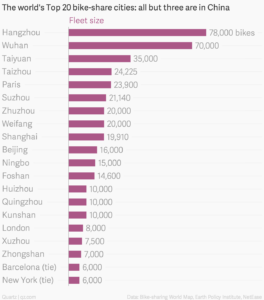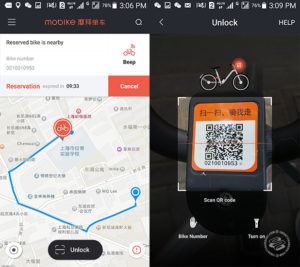MoBike – A Sharing Economy That Go Green

With sharing-economy companies like UBER are debatably providing environmental values in reducing greenhouse gas emission, is the hot bike-sharing startup in China “growing” to make some difference?
With population growth and rapid urbanization in China, major cities are experiencing worse than ever traffic congestions and air pollution related to tank-to-wheel emissions. Use Shanghai as example, the number of cars registered in the city rose 13 percent last year to almost 2.5 million, compared to 2.2 percent growth in city’s road network.[1] Similar problem in other metropolitan areas resulted in tightening regulations from government such as limiting the number of new vehicle license issued annually, restricting weekday usages based on license plate numbers, promoting shared transportation and free government sponsored city bikes. Despite the growing car ownerships, bike remains a major way of transportations for Chinese. Moreover, with economic development, increased awareness in health and exercise in the past few years, cycling has become more popular again.
Applying the share-economy concept, a couple bike-share startups have emerged, with MoBike being one of them, and have raised a combined $200 million investment to fund future growth. Facing increasing competition from free city bikes funded by public sector[Figure1], is MoBike “growing” to make a difference?
Compare with existing bike sharing programs, particularly with free city bikes in China, Mobike offers a few points of differentiations:
1.There are no bike pick up/drop off stations. MoBike allows you to locate any available MoBikes nearby, rent for just 1RMB ($0.15) per half hour, then drop the bike off wherever you like in the city, rather than search for a depot as with the government-run alternatives.
2.There are no keys. No more losing keys or carrying one in your pocket. With QR code on every bike, you can lock/unlock bikes with mobile device in seconds.
3. Theft prevention. In order to locate each bike at any location, each bike is equipped with a GPS, which also helps to find lost/stolen bikes.
Besides these above differentiators, MoBike also considered potential causes to a bad customer experience. For example, when a customer located a nearby MoBike, walked over only to find it is broken, it will hurt the company image of being convenient and reliable. To prevent that from happening, the company decided to design and customize all their bikes to address these specific needs, requiring their bike manufacturer to provide extended quality warranty, to minimize cost resulted in broken bikes. Via customization, they also simplified bike design to the bare minimum, removed accessories such as racks and baskets, to avoid customers leaving trash on the bike and leaving bad customer experience to the subsequent riders.
Going forward, in addition to continuous expansion into high population density areas, I think the company can also consider several options:
- Specify return location if picked up at major transportation stations. For longer distance commuters who choose to drive instead of using public transportation, it is often because of end locations are still some distance away from bus/train stations. Having sufficient amount of bikes at major transportation stations during rush hours will make bike sharing an better alternative to driving.
- Partner with healthcare providers to provide discount on service or insurance premiums based on accumulative bike miles. With GPS equipped on the bike and a mobile app, MoBike can potentially track parameters like speed or slope, and turn commute biking into daily workout.
Some people argue that sharing-economy could be on the opposite side of benefiting the environment[2]. The idea is that when people share resources, the cost lowers for individuals who consume the resources, and they end up use more of it. It is still early to proof how much emission is saved from people who shift vehicle usage to bikes, but hopefully the economy of scale in the bike sharing business will promote more people to give it a try.
(633words)
[1] Zhang Ningning, March 22, 2016, Tuesday, www.Shanghaidaily.com, http://www.shanghaidaily.com/metro/public-services/Number-of-cars-on-citys-streets-increases-to-25m/shdaily.shtml
[2] STEVEN HILL, MAR 14 2016,www.sierraclub.org , http://www.sierraclub.org/sierra/2016-2-march-april/green-life/sharing-economy-truly-green






Thanks for the article, Jollynl. I lived in Beijing for a summer and found biking around the city to be much easier than driving in traffic.
That being said, I think that MoBike may have a hard time beating its competition. The Chinese government is strongly incentivized to encourage biking by its urban citizens (to reduce traffic and automobile emissions) and I suspect that the public subsidies for bike sharing services will only increase. The government will not be as concerned with operating a profitable bike sharing business, which puts MoBike on an unfair playing field if MoBike has to charge more for its services.
While I believe that the threat of climate change will increase the percentage of citizens that ride bikes around the city, MoBike may want to consider partnering with the public sector, or perhaps even selling its technology to the government in order to make sure it can continue to reach new customers.
Thank you so much for an interesting article. I fully agree with the potential of bike sharing service in urban cities – we started seeing this in many cities in U.S. and there will be a high chance that this trend will continue in urban cities in emerging countries like China. One way to look at this issue will be how to integrate this with other transportation services. Bicycle is a great way to move within the central area, but it will not become a major way to commute from suburban areas to the central area. Therefore, creating a end-to-end chain of transportation is critical, e.g., commuting from suburban areas to the central area by train, and then use bicycle from the train station to the offices. In order to realized this, partnership with public sector will be critical for such services to become successful
Thanks for an entrepreneurial post. My article is also about sharing economy from Uber’s perspective. Many scholars have conflicting and controversial views on effect of sharing economy in sustainability since it may gain shares from public transport. However, in the case of bikes, i would favor sharing economy to be eco-friendlier. I lived in Nigeria and there was bike rental services in a very primitive way but it was a great and budget friendly solution to traffic congestion. On the hand , i still have concerns about the scalability of the business model globally although I am very fascinated that it works in an emerging country despite the safety and trust issues. Many bike sharing companies in middle east and eastern Europe region struggles due to low customer interest due to safety and trust barriers.